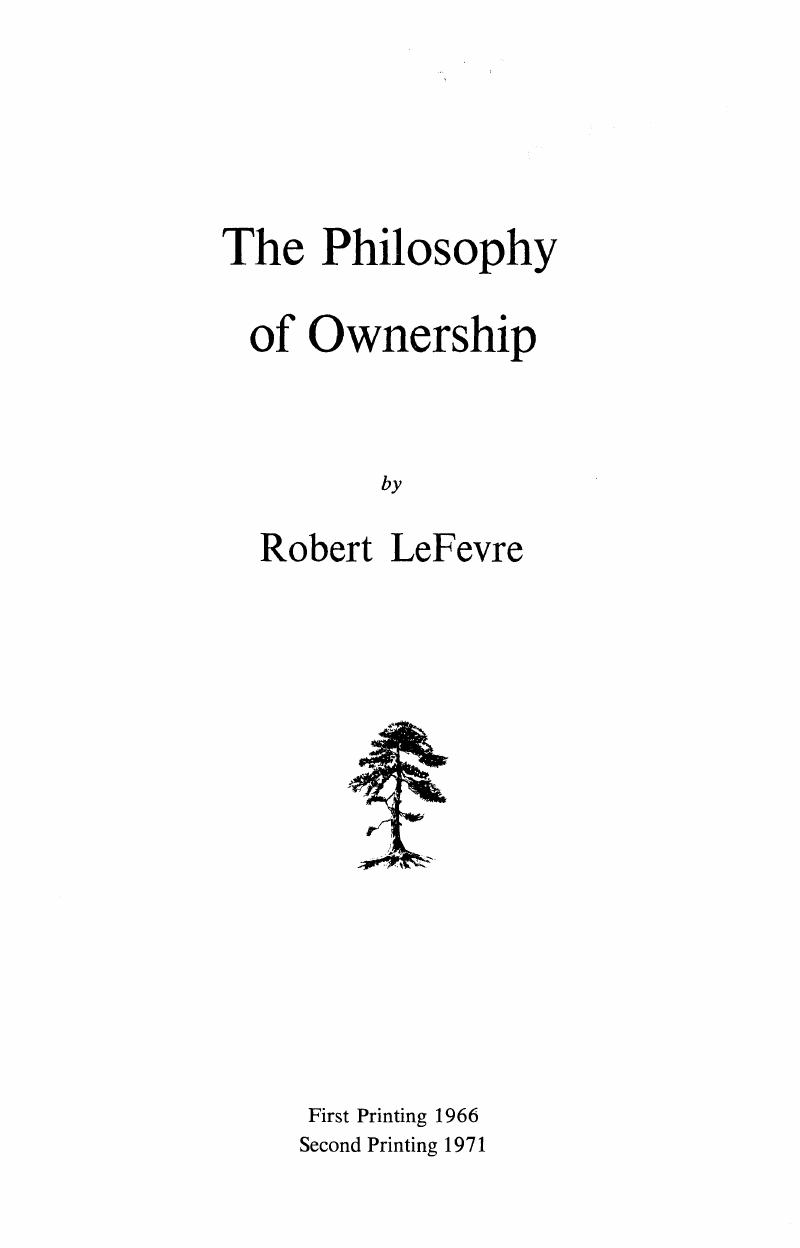The Philosophy of Ownership by Robert LeFevre

Author:Robert LeFevre [Robert LeFevre]
Language: eng
Format: epub, pdf
ISBN: 978-1-61016-286-9
Publisher: Ludwig von Mises Institute
Published: 1971-11-06T16:00:00+00:00
Chapter VIII
Ownership of Land
Land has been owned both collectively and privately. The evidence reveals that in earliest times, before men learned to establish cities, they laid claim to hunting and foraging territories, establishing a kind of collective control over the area. This is collective ownership, for it excludes the private owner and presumes that all items of value found in the claimed territory are to be used for the good of the group. Primitive tribes forbade private exclusiveness in land.
American Indians, at the time the first Europeans came to the Western Hemisphere, in the main practiced collective ownership of the land. The tribe claimed the territory. White men, seeking to make treaties with the Indians, purchased such territories from the Indians without completely conveying the meaning of their purchase to the aboriginals. Indian chiefs, swapping land for so many hatchets and glass beads, looked upon the property they were conveying as having existence only in those things they themselves valued. Thus, they were dismayed when they found white men clearing land, taking out the trees, and putting up permanent-type structures. It is entirely reasonable to assume that many a chief, bartering away his land for so many trinkets, thought of the trinkets as a fair exchange for the game animals, fish, or water rights in the territory up for barter. Perhaps he was, in his own scale of values, conducting a shrewd trade in an area where most of the game animals had already been killed or run off. He may have thought he was giving the white man little if anything of value for these elaborate man-made items of cutlery and decoration which the Indian could not possibly produce. When the white man cultivated the earth and thus more fully utilized the hunting ground, the Indian may have belatedly awakened to the nature of the white man’s intention. This could well have served to stimulate a number of Indian hostilities and uprisings.
In many places in the world, some land passed into private ownership or control while other territory was maintained as the basic collective property. In early Russia, under the mir system,14 long in vogue, each young man as he reached maturity was ceded a certain number of acres for his own use and that of his family. These acres were taken from the collective mir and exploited privately. In a sense, this pre-czarist and czarist system has been re-established by the Soviet system, which contends that all land is socialist property but permits each household of a collective farm to have a “subsidiary husbandry” on a plot of land between one-fourth and three-fourths acres in size. This “husbandry” is generally viewed as “private” property and to date, in Russia, produces proportionately far more food crops than the huge collective farms. Since the household pays no taxes on this land, a degree of private ownership exists in Russia which is, in an economic sense, far more in harmony with laissez-faire ownership than our own system. Of course, the Russian
Download
The Philosophy of Ownership by Robert LeFevre.pdf
This site does not store any files on its server. We only index and link to content provided by other sites. Please contact the content providers to delete copyright contents if any and email us, we'll remove relevant links or contents immediately.
The remains of the day by Kazuo Ishiguro(8997)
Tools of Titans by Timothy Ferriss(8393)
Giovanni's Room by James Baldwin(7345)
The Black Swan by Nassim Nicholas Taleb(7128)
Inner Engineering: A Yogi's Guide to Joy by Sadhguru(6792)
The Way of Zen by Alan W. Watts(6614)
The Power of Now: A Guide to Spiritual Enlightenment by Eckhart Tolle(5781)
Asking the Right Questions: A Guide to Critical Thinking by M. Neil Browne & Stuart M. Keeley(5772)
The Six Wives Of Henry VIII (WOMEN IN HISTORY) by Fraser Antonia(5514)
Astrophysics for People in a Hurry by Neil DeGrasse Tyson(5189)
Housekeeping by Marilynne Robinson(4445)
12 Rules for Life by Jordan B. Peterson(4303)
Ikigai by Héctor García & Francesc Miralles(4273)
Double Down (Diary of a Wimpy Kid Book 11) by Jeff Kinney(4268)
The Ethical Slut by Janet W. Hardy(4251)
Skin in the Game by Nassim Nicholas Taleb(4248)
The Art of Happiness by The Dalai Lama(4130)
Skin in the Game: Hidden Asymmetries in Daily Life by Nassim Nicholas Taleb(4004)
Walking by Henry David Thoreau(3960)
